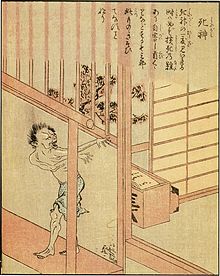Shinigami
Shinigami ( Japanese 死神 shini gami , German 'God of the wish for death' , analogously also 'death spirit', ' death angel ') is the term in Japanese culture for personified death (corresponding to the grim reaper in western culture) and for gods who Lead souls of deceased people who are still bound to the living world into the world of the dead ( according to the Greek psychopompos ).
background
The term Shinigami does not come from traditional Japanese mythology , it came about later and is a combination of Japanese 死 shi , German 'death' and 神 Kami (-gami) , German 'god or spirit' . It differs from the western concept of God and is to be understood more as a spirit of the dead . The Shinigami are not viewed as all-powerful in Japanese culture, like the gods of Western god traditions and myths . Lafcadio Hearn describes the Shinigami as follows in his book Out of the East :
"[...] he who makes the grave appear more beautiful to them, who are fearless, than the palace, he whom the people call Shinigami, the lord of the death wish. For them, the future holds no horrors. [...] In the cycle of countless years she will float in the realm of beauty above the misty realm of the dreamy cedar shadows. "
Shinigami does not actively kill anyone. In contrast to the Grim Reaper, Shinigami can appear in pairs. Shinigami spirits determine the point in time at which an individual dies. These spirits, often described as dark and malevolent, are usually invisible to humans. Only when death is imminent do they reveal themselves to the one whose death has been determined. They are regarded as searching spirits who track down wandering souls of deceased people and lead them into the realm of the dead. In addition to this, other spirits of the dead are known in the Japanese religion. Yūrei Japanese 幽 霊 'dark spirit / soul' or Bōrei 亡 霊 'spirit of the dead, lost souls' , these can be dressed in a white 死 に 装束shini shōzoku , German 'death robe' .
A demon called Mara is known from Buddhism , who, unlike Shinigami, actively drives people who are possessed by him into suicide. In Japanese culture, for example, it was customary for the samurai to kill themselves ( seppuku ) if their behavior had brought disgrace to the family.
reception
In Japanese pop culture, Shinigami appear primarily as characters in manga and anime , such as in Bleach , Death Note , Fullmoon wo Sagashite , Noragami , Soul Eater , Black Butler , Shinigami no Ballad or Yami no Matsuei . The main character Hei from Darker than Black is also called "Kuro no Shinigami" in German "Black Shinigami".
In 1971, the composer wrote Ikebe Shin'ichiro an opera in two acts entitled Shinigami ( english The Death Godess , the goddess of death ' ) based on the fairy tale The Grim Reaper of the Brothers Grimm is based.
Novels
- Django Wexler: Shinigami . Medallion Press, 2006, ISBN 1-60542-912-0 .
Web links
- Wu Mingren: Shinigami: The Grim Reaper and God of Death in Japanese Folklore ancient-origins.net
Individual evidence
- ↑ News from Japan - Kanji of the month: "SHI, shi (nu)". japan.go.jp, accessed May 23, 2020 .
- ↑ Lafcadio Hearn: Kyūshū: Dreams and Studies from the New Japan . Rütten & Loening, Frankfurt am Main 1921, p. 283 ( Textarchiv - Internet Archive - English: “Out of the East”: reveries and studies in new Japan . 1892. Translated by Berta Franzos).
- ↑ Ikebe, Shin-ichiro: 池 辺 晋一郎 zen-on.co.jp (under Works - Operas and other works - オ ペ ラ < 死神 > ).
